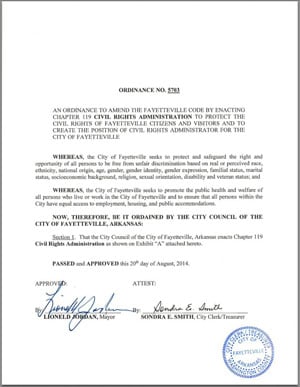
Ballot language as approved by the Washington County Election Commission
Washington County Clerk’s Office
A group working to repeal Fayetteville’s new civil rights ordinance is one step closer to getting its preferred language on a Dec. 9 special election ballot.
The Washington County Election Commission on Thursday sided with petitioners who want a “For” vote to be used to repeal the ordinance.
City Council members earlier this week said that language was too confusing and that it was more understandable for a “For” vote to actually be a vote for the ordinance and an “Against” vote to be a vote against the ordinance.
The new law would prohibit business owners and landlords from unjustly firing or evicting someone because of their sexual orientation, gender identity and other characteristics.
The ordinance was approved in late August, but petitioners with a group called Repeal 119 turned in enough signatures to put the ordinance on hold and force a special election to decide the fate of the ordinance.
Elections coordinator Jennifer Price said the commission based its decision on advice from County Attorney George Butler, who said it is typical procedure to use ballot language recommended by petitioners in a referendum election.
Legality in question
Fayetteville City Attorney Kit Williams said in this case, the recommended language could violate state law.
While the state does spell out rules for referendums on county ordinances, Williams said municipalities do not have their own specific state statute to clearly explain how ballots should read.
Arkansas law, however, does state that ballots should be designed to ensure voters are not misled at the polls, said Williams.
“The statutory requirement that a “For” vote must be for the measure and cannot be against its enactment is made very clear,” he said.
Quoting from Walmsley v. Martin, Williams said the courts have explained that “the purpose of a ballot title is to allow a voter to reach an intelligent and informed decision for or against the proposal and to understand the consequences of his or her vote.”
Williams urged City Council members not to approve the petitioners’ language. He suggested aldermen amend the recommended ballot title to something less confusing.
Travis Story, general counsel for Repeal 119, said he doesn’t believe it’s up to Williams – or the City Council – to decide what the ballot title should be.
“We simply feel that the language that’s on the petition should be included on the ballot,” said Story. “Anything else that would be added or subtracted from the petition language, we don’t believe would be found as a jurisdictional matter for this council.”
Williams said it’s not a matter of whether the City Council “can” change the wording on the ballot, but that they “must” revise the ballot title in order to have a valid election.
Aldermen sided with Williams and voted unanimously to approved revised language which states that a “For” vote is a vote in favor of the ordinance and an “Against” vote is a vote against it.
What’s next?
If the commission’s decision is challenged, it’s possible the special election could be moved to a later date.
State law requires a referendum to be held between 60 and 120 days after signatures are certified. Since special elections must be held on the second Tuesday of the month, the latest the election could occur is Jan. 13.
Chapter 119, Civil Rights Ordinance
Fayetteville City Council members passed a controversial anti-discrimination ordinance at around 3:45 a.m. Wednesday, Aug. 20 after nearly 10 hours of public discussion and debate inside City Hall.
The ordinance prohibits business owners and landlords from unjustly firing or evicting someone because of their sexual orientation, gender identity, socioeconomic background, marital status or veteran status. It also creates a civil rights administrator position to receive and investigate complaints from residents who feel they are victims of those specific types of discrimination. Offenders could be fined up to $500 if it is determined they violated the ordinance.
The ordinance was approved 6-2 with council members Adella Gray, Sarah Marsh, Mark Kinion, Matthew Petty, Rhonda Adams and Alan Long voting in favor of the measure. Ward 3 aldermen Justin Tennant and Martin Schoppmeyer voted against the ordinance.
A group called Repeal 119 immediately began a petitioning campaign to stop the implementation of the ordinance, and eventually turned in enough signatures to put the new law on hold and force a Dec. 9 special election to decide the fate of the ordinance.


